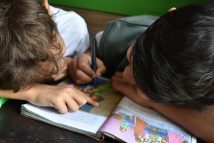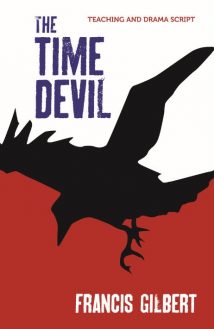Reading Reform
-
The Time Devil runs amok: How I improved my creative practice by adopting a multimodal approach for a specific audience.
How teacher-writers can improve their craft and pedagogy by writing for a specific audience, namely school children. And why they might do so.
-
Riding the Reciprocal Teaching Bus. A teacher’s reflections on nurturing collaborative learning in a school culture obsessed by results
My interactions with the teaching strategy known as Reciprocal Teaching (or Reciprocal Reading), which involves students learning to read collaboratively in small groups.
-
Dreaming of a Better World
A creative writing and reading project, carried out at Deptford Green school, which put the principles of Reciprocal Teaching into practice.
-
The Time Devil
A fantastic time-travelling story in the format of a ‘teaching script’, which helps teenage readers improve their ability to skim, scan, summarise, and ask questions.
-
Five Ways to Revolutionise Reading in Your School
These suggestions are based on the points raised at the Reading Revolution Conference held at Goldsmiths, University of London on Saturday 23rd September 2017. ONE: Encourage Reading for Pleasure Read for the sake of reading. Read aloud, read in groups, read in pairs, read silently. Read poems, stories, articles, blogs, relevant social media and so […]
-
How can we help secondary school students read for pleasure and improve their reading skills? #GdnBLReading
Yesterday I spoke at the Guardian Education Centre for a conference on Reading for Pleasure in the secondary classroom. The Guardian’s literary editor, Claire Armistead, kicked off the day by explaining that we need our young people to enjoy reading and to read whole texts which are not part of the curriculum; she pointed out […]
-
Reciprocal Teaching and the Time Devil
I’ve been working hard at helping Key Stage 3 students in Deptford Green school, a London comprehensive, to develop their reading skills. To that end, I have written a book, The Time Devil, which is set partly in Deptford Green and partly in the National Maritime Museum, whom we are also working with. I have […]
-
Improving students’ reading using Reciprocal Teaching
Respected research has shown for some time that certain teaching approaches are particularly effective at improving students’ reading skills; one such strategy is called Reciprocal Teaching (Oczkus, 2010:Palincsar and Brown, 1984) which gets learners reading in groups. I’ve written about the success of this strategy in two previous issues of NATE Magazine (June 2015/June […]
-
Let’s support the summer reading challenge and get every child reading!
The Summer Reading Challenge is a really cool project which aims to get schools, libraries and parents working together so our children might actually do some reading they like this summer! For an English teacher like me, this is the Holy Grail: if one of my pupils actually enjoys reading, then everything else follows; happiness […]
-
The National Scandal! Teaching Reading — my correspondence with Susan Godsland at the RRF
Speaking at the Reading Reform Foundation conference has really crystallised my thoughts on the teaching on reading. I found it both positive and depressing. Positive in that the RRF is offering concrete solutions that appear to work, but depressing but they’ve been ignored for too long. Here is my correspondence so far with Susan Godsland. […]
-
Have government policies failed to teach our nation to read?
I spoke at WAVES — the Reading Reform Foundation Conference — today, giving my views on twenty years of teaching — and sometimes failing — to teach reading. I spoke about the changing times: how when I first taught there was no internet, no mobile phones, no social networking sites, and how the class reader was […]




